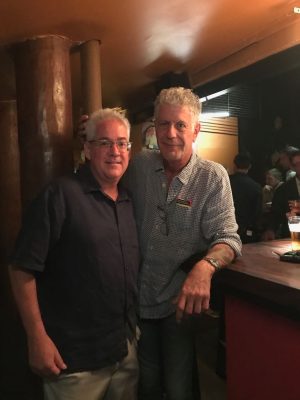On Anthony Bourdain’s last trip across Indonesia he stopped at Jakarta’s foreign correspondents’ bar for a session of wisdom and laughter with another legend of sorts, journalist Joe Cochrane.
“There’s a lot of problems here, but one of the great things going on is these elections are free and fair, and everybody knows it,” Cochrane told the cooking icon and host of the CNN series “Parts Unknown” in 2018.
After decades of dictatorship, chaos, and repression, Indonesia had come that far. Cochrane knew because he had covered so much of the story since the late 1990s.
Cochrane’s friends, family and admirers are now mourning his passing and feeling less informed about the world’s fourth-most-populous nation. The 53-year-old American died in Indonesia’s capital on November 12 and was buried there the following day by his Indonesian family.
“I can’t imagine Jakarta without him,” the Australia Broadcasting Corporation’s former Indonesia correspondent, Helen Brown, said in an email, describing his impact as immeasurable.
Crusty, quick witted, and most of all compassionate, Cochrane was known as an impartial observer of the complex archipelago he loved, covering four of its presidents.
A charmer, he once convinced President Joko Widodo to take a photo with his young son Sean not long after blasting the leader’s administration.
Neither a book writer nor self-promoter, Cochrane instead was a master connector, backroom influencer, and community builder.
With his bobbing column of gray hair, Cochrane’s magic usually happened after dark, in a bar, amid a swirl of journalists, diplomats, NGO workers, anthropologists, and the assorted schemers calling Jakarta home.
“Joe was always willing to share what he knew, even important contacts, and that made me value him as a friend as much as a colleague,” former Time magazine correspondent Jason Tedjasukmana said in an email.
Indeed, the Cochrane rolodex, the last version being a WhatsApp contact list, was a coveted commodity. He shared it anyway, especially with reporters in need.
“Joe was really the first guy who helped me out as a freelancer,” Jeffrey Hutton of Singapore’s Straits Times said on the Reformasi Dispatch, a regional podcast that honored Cochrane last week.
Cochrane served as The New York Times Indonesia correspondent from 2013 to 2019. Over the years he also filed for The Diplomat, South China Morning Post, Washington Post, Newsweek, Economist, and Wall Street Journal Asia.
Along the way, Cochrane covered the post-9/11 wars in Afghanistan and Iraq, embedding there at the height of the conflict with an Explosive Ordnance Disposal Mobile Unit.
The youngest of 10 children, Cochrane grew up in the Virginia suburbs outside Washington, D.C., before studying journalism at Virginia Commonwealth University. A devotee of punk rock and subversive, vibrant culture, Cochrane moved to Southeast Asia after the end of the Cold War.
At first Cochrane tackled the wildest of the region’s beats, Cambodia, before moving to Jakarta, where he developed into a pillar of the community.
Indonesia’s news was often fast, furious, and tragic. From 1998 to 2004 the country had four presidents because none managed to serve a full five-year term. The al-Qaida-affiliated militant group Jemaah Islamiyah terrorized the islands with deadly bombings. More than 100,000 people were killed in Aceh province by the 2004 tsunami.
Cochrane made his presence felt as one of the founding editors of the Jakarta Globe newspaper and as a four-time president of the Jakarta Foreign Correspondents Club, where he advocated for Indonesian press freedoms.
Cochrane’s reporting highlighted outrages like female genital mutilation in Indonesia but also focused on the country’s progress as democracy grew and regional autonomy blossomed.
President Barack Obama’s relationship with Indonesia delighted him.
When Obama, who lived in Jakarta for four years as a kid, visited in November 2010, Cochrane wrote in the South China Morning Post that the U.S. president had “paid back his boyhood home of Indonesia big time this week” by stressing that it was not “a dangerous backwater and overrun with radical Muslims” but instead was “an emerging global economic power.”
As Indonesia entered into an era of optimism, Cochrane and his Indonesian wife Yuliana “Ana” Cochrane embraced it, hosting family barbecues at their courtyard house in central Jakarta, a hive of action among expatriates and Indonesians alike.
“I love America, I just live here,” Cochrane told me in 2012 at his son’s third birthday party as toddlers scrambled past. A few days later, Cochrane helped me host an event with Indonesia’s greatest poets, including Goenawan Mohamad.
At The Call to Poetry event in Jakarta, Cochrane smiled and told me: “Freedom? Freedom is being in Indonesia and gathering people to hear beautiful words.”

































